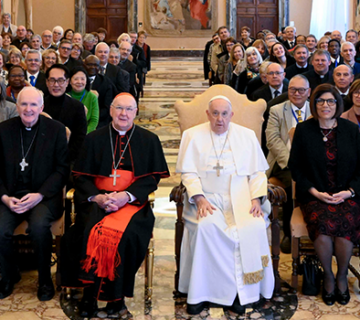More about Maria Voce’s visit to North America – March-April 2011
What expectations do you have in visiting Canada and the U.S. and the Focolare communities here?
 Like other trips I’ve made, my greatest desire is to walk in the footsteps of Chiara Lubich and discover with all of you, in the light of that unity that Jesus brings with his presence when we love each other, what new steps need to be taken in order to fulfill God’s plan on each country and the whole continent — a plan that Chiara, prophetically, already intuited.
Like other trips I’ve made, my greatest desire is to walk in the footsteps of Chiara Lubich and discover with all of you, in the light of that unity that Jesus brings with his presence when we love each other, what new steps need to be taken in order to fulfill God’s plan on each country and the whole continent — a plan that Chiara, prophetically, already intuited.
Chiara visited the U.S. several times. She was struck from the start by its international flavor and by the simplicity that characterizes it, features she thought made this country particularly receptive to the spirit of the movement. I remember that in 1990 in New York City, a few months after the fall of the Berlin Wall and other similar walls in Eastern Europe, she talked about other walls that needed to come down — the walls of materialism, consumerism and hedonism. She prayed that God would hasten the arrival of a united world.
What can the charism of unity offer in these painful times, caused by, among other things, the economic crisis? We will find out. It seems to me that it can help us gain awareness that all peoples need one another, that we will overcome the crisis only if we activate a dynamic exchange of each other’s particular gifts. The specific calling Chiara envisioned for the movement in the U.S. and Canada was to activate a communion of spiritual and material goods, to create community everywhere.
Today it is more urgent than ever to create unity and community. It is a question of survival.
What have you discovered in visits to so many countries? What do you take away from these encounters?
Each visit has profound repercussions, and not for me alone. Here are two examples.
Africa and Asia were the first two continents I visited, and I was deeply touched by the wealth of values I found there that here in the West we have come to consider obsolete. While in the West the virus of individualism spreads, when I went to Cameroon in 2009 I saw how natural communal life is for Africans. I was struck by their religiosity: they experience their religious celebrations as integral to their lives, and their whole lives are a celebration. I saw this in Asia too: South Korea, Japan, the Philippines, Thailand and Pakistan. I was fascinated most of all by their sense of the sacred, their sensitivity to the divine. I also saw great gentleness, exquisite hospitality and an exceptional capacity to bear very painful situations.
To encounter and truly appreciate these values, among other things, helps us Westerners to free ourselves of the sense of superiority we unconsciously harbor, which truly melts away when we enter their culture with them. You find that your own sense of humanity becomes richer, that you are on your way to acquiring a global mind open to all cultures. And this is needed more than ever in our contemporary world, which in spite of evidence to the contrary is actually speeding toward unity.
You have given special attention to the youth. Why is this, and what do you hope for in meeting them?
I give special attention to the young people because I’m more and more convinced that they have tremendous potential and that they are asking us to listen, and to allow them to be the agents of a change we all very much want.
In the last few months it has been in the news every day: young people are taking center stage in country after country all over the world. They have the courage to take to the streets and say “no” to the myriad forms of corruption and injustice and to ask for bread and knowledge. And they are forcing people to pay attention.
Let me give you an example that took place in Spain last January when I was there. The young people there asked me to engage in dialogue with them during an event they entitled, “Positive revolution: protagonists in our world.” It wasn’t a last-minute thing. In the months that led up to it we had numerous exchanges via Skype on how to structure the encounter. My role was mainly to encourage them to offer their own answers to the questions that trouble young people today — and they found those answers by putting the Gospel into practice. They themselves were able to come up with the innovative language needed to communicate these answers effectively: they used music, workshops and exchanges of experiences in an event marked by a festive atmosphere, which lasted 12 hours!
I proposed to the many youth gathered there to aim high, to be love in action for everyone they meet in order to successfully carry out the positive revolution they want, and I felt that my words were hitting home. I am sure I can expect this and more from the youth here in North America.
How do you manage to follow such a vast movement, so that the Focolare remains faithful to Chiara Lubich’s inspiration and legacy?
The first “word” that comes to mind is “For them I sanctify myself” (Jn 17:19). I feel very strongly at this time that a renewed commitment to strive for holiness is what is needed. This was emphasized by the beatification of Chiara Luce Badano [an 18-year-old Focolare member], and by Pope Benedict XVI himself when he received me in an audience.
I often think back to the small group formed by Chiara and the first people who followed her. They lived love. They communicated God’s tremendous attractiveness with their very being and with words of life.
This strengthens in me the belief that the closer we get to God, the more we are faithful to Jesus crucified and forsaken — who has the power to “dry up the waters of tribulation,” as Chiara wrote, in those who are close to us, in ourselves and in the many difficult situations we encounter — then the more we contribute to unity, to the fulfillment of God’s plan for the movement to the benefit of the world, keeping the presence of Jesus alive in our midst.
We also have to keep in mind the principle of communicating vessels. Look how many all over the world have by now climbed aboard the train of what we call the holy journey of life (see Ps 84:6). Look how much suffering has been transformed into love by people in hospitals and by those who are close to the end of this journey.
As early as the 1950s, Chiara used to say that this is the way to create that “system of spiritual pulleys that will lift up the world.” Together we will carry everything ahead.
Clare Zanzucchi


 Italiano
Italiano Español
Español Français
Français Português
Português


